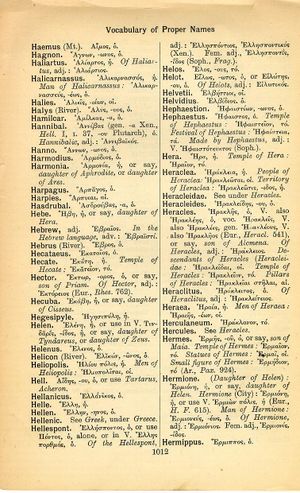Hermes
μηδενὶ συμφορὰν ὀνειδίσῃς, κοινὴ γὰρ ἡ τύχη καὶ τὸ μέλλον ἀόρατον → never mock a disaster, fate is common to all and the future unknown
English > Greek (Woodhouse)
Ἑρμῆς -οῦ, ὁ, or say, son of Maia.
Temple of Hermes: Ἑρμαῖον, τό.
Statues of Hermes: Ἑρμαῖ, οἱ.
Small figure of Hermes: Ἑρμήδιον, τό (Ar., Pax. 924).
Latin > English (Lewis & Short)
Hermes: or Herma, ae, m., = Ἑρμῆς (Hermes, Mercury; hence transf., cf. Liddell and Scott under Ἑρμῆς),
I a Hermes pillar, Hermes, a head carved on the top of a square pedestal or post; such pillars of Hermes stood, esp. in Athens, in several public places and before private houses, Macr. S. 1, 19; Serv. Verg. A. 8. 138; Nep. Alcib. 3; Cic. Leg. 2, 26, 65; id. Att. 1, 8, 2; Juv. 8, 53.—
II Deriv.: Hermae-um, i, n., a temple of Hercules, Hermœum.
A The name of a summer-house: in diaetam, cui nomen est Hermaeum, recesserat, Suet. Claud. 10.—
B A frontier town of Bœotia, over against Eubœa, Liv. 35, 50, 9.
Latin > French (Gaffiot 2016)
Hermēs¹⁴ (Herma), æ, m. (Ἑρμῆς),
1 Hermès ou Mercure || Hermæ, ārum, pl., Hermès, gaines surmontées d’une tête de Mercure ; [en gén.] bustes : Cic. Leg. 2, 65 ; Att. 1, 8, 2
2 Hermes Trismegistus, m., Hermès Trismégiste [dieu ou sage égyptien] : Lact. Inst. 1, 6, ou Trimaximus Amm. 21, 14, 15
3 nom d’hommes : Mart. 5, 24 ; 10, 56, 7.

